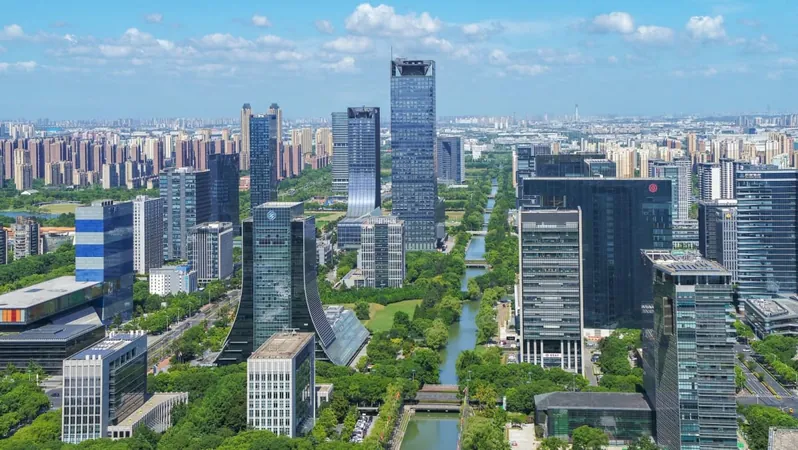
Suzhou Industrial Park: Pioneering a New Era of Innovation
2024-12-06
Author: Nur
Suzhou Industrial Park: Pioneering a New Era of Innovation
Nestled on the banks of Suzhou’s picturesque Jinji Lake, the Suzhou Industrial Park (SIP) has revolutionized itself from its humble beginnings built over swamp land into a dynamic hub of innovation. This year marks its 30th anniversary, a milestone that showcases its evolution into one of China's premier industrial zones.
A Powerhouse of Economic Growth
The park, launched as the first intergovernmental collaboration between Singapore and China, has become an economic juggernaut, boasting a regional GDP of 368.6 billion yuan (approximately US$54.2 billion) last year, which constitutes a remarkable 15% of Suzhou's total GDP. The area has blossomed into a vibrant township, accommodating around 1.3 million residents and providing essential infrastructure such as homes, schools, cultural centers, and parks—all while enjoying the stunning lake view.
In October, Chan Chun Sing, the minister-in-charge of Suzhou Industrial Park, articulated the park's relevance, emphasizing its integral role in bridging China with global markets. Noteworthy is its ability to attract foreign investment; SIP currently hosts over 250 foreign-funded research and development centers and 200 multinational corporation headquarters.
Setting the Stage for Future Industries
Far from resting on its laurels, SIP is fiercely pursuing advancements in sectors such as clean energy, biomedicine, and digital technology. Emerging high-tech industries—including biomedicine, nanotechnology, and artificial intelligence—produced an impressive output of over 400 billion yuan in the previous year alone.
Innovation Incubator
SIP thrives on incubating innovative endeavors. From January to September this year, the park added more than 1,000 new science and technology projects, including 61 "unicorn" startups valued over US$1 billion. The Suzhou International Science Park, part of this ecosystem, has fostered over 5,000 enterprises, with 21 achieving public listings.
Among its notable successes is iFLYTEK (Suzhou) Technology, which specializes in advanced technologies across various domains, including intelligent robotics and cognitive computing. Today, the park is home to over 1,800 businesses in the AI and digital sectors, with this subset alone generating an output value exceeding 100 billion yuan last year.
Pioneering in Nanotechnology
Nanotechnology is another key focus area for SIP. Collaborating with institutions from the U.S., Finland, and Singapore, the park has established over 20 Sino-foreign cooperative innovation centers. It houses nearly 600 nanotechnology enterprises, generating over 155 billion yuan in output in this sector alone.
The establishment of Suzhou Nanopolis in 2013 has further solidified SIP's status as the world’s largest community dedicated to nanotechnology applications, facilitating collaborations that push the envelope of innovation.
Global Brands Making Their Mark
SIP has drawn in major multinational corporations (MNCs) that are not only setting up manufacturing plants but also high-end R&D facilities. For instance, Roche Diagnostics recently inaugurated an Asia-Pacific R&D center in SIP, with an impressive investment of approximately US$425 million—the largest single investment the company has made in China.
Prominent firms like Danaher Corporation, Philips, and Nestlé have also expanded their presence in SIP, while newcomers like Olympus and Integra have launched their R&D bases in China for the very first time.
Commitment to Sustainability
As SIP flourishes, it remains steadfast in its commitment to sustainability. Its energy consumption and carbon emissions are notably only one-third of national averages, while its water usage is a mere 10% of what is typically observed in other regions.
The park features 316 ESG-focused enterprises generating a revenue of 50 billion yuan collectively, showcasing a robust commitment to environmental stewardship. Notable among these efforts is Swiss packaging leader SIG, which reported a significant reduction in organic waste emissions and a 100% recyclability rate for its packaging products.
Furthermore, SIP has established collaborations with Singaporean companies such as Keppel and Surbana Jurong to develop a net-zero carbon emissions zone while engaging in large-scale wind and solar power projects.
A Vision for the Future
Recently, during the China-Singapore Suzhou Industrial Park High-Quality Development Forum, Vice Premier He Lifeng remarked that the 30th anniversary is a new starting point for the park. Emphasizing the importance of refining the industrial chain and boosting investment attraction strategies, the vision for SIP aligns with both national growth ambitions and global sustainable development initiatives.
As Suzhou Industrial Park embarks on its next chapter, it stands poised to shape not just the future of innovation in China, but possibly the global landscape itself.



 Brasil (PT)
Brasil (PT)
 Canada (EN)
Canada (EN)
 Chile (ES)
Chile (ES)
 España (ES)
España (ES)
 France (FR)
France (FR)
 Hong Kong (EN)
Hong Kong (EN)
 Italia (IT)
Italia (IT)
 日本 (JA)
日本 (JA)
 Magyarország (HU)
Magyarország (HU)
 Norge (NO)
Norge (NO)
 Polska (PL)
Polska (PL)
 Schweiz (DE)
Schweiz (DE)
 Singapore (EN)
Singapore (EN)
 Sverige (SV)
Sverige (SV)
 Suomi (FI)
Suomi (FI)
 Türkiye (TR)
Türkiye (TR)